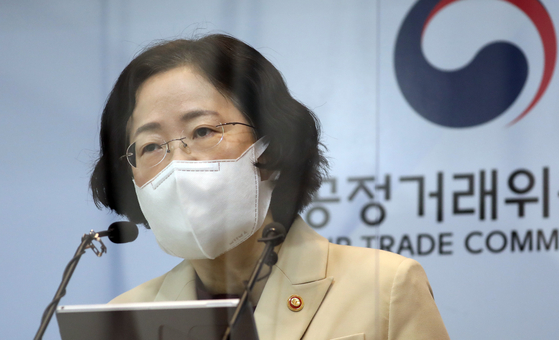
On the 5th, Chairman of the Fair Trade Commission Cho Sung-wook is explaining the amendment to the Electronic Commerce Act at the Government Complex Sejong. News 1
In the future, when a consumer suffers damage while trading on an online platform, not only the merchants but also the platform must compensate. When a dispute arises while transacting in the’used country”carrot market’, the brokerage company must provide the seller’s identity information.
In this direction, the Fair Trade Commission decided to revise the law on consumer protection in e-commerce (e-commerce law) drastically. This is to reflect the changed Internet environment over the past 19 years of enacting the law. Although it focused on preventing consumer damage, some point out that it puts excessive responsibility on online businesses.
On the 7th, the Fair Trade Commission announced that it had announced the legislative amendment to the Electronic Commerce Act. The FTC expected that through the revised bill, it would be possible to reduce consumer damage that is common in recent online transactions, such as loss of contact during second-hand transactions or purchasing products by being fooled by a so-called’search advertisement’.
The amendment was devoted to strengthening the responsibility of online platform operators for consumer damage. Previously, by simply notifying that the online platform operator was an intermediary, it was possible to escape responsibility for consumer damage. In the amendment, the platform is responsible for paying, receiving, and refunding payments, and in case of deliberately or negligently damaging consumers, the platform will be held liable for compensation with the participating companies.
No’advertising’
The advertisement was clearly indicated. This is to prevent consumers from buying products by mistaken advertising products as pure search results. In order not to misunderstand advertisements that reflect preferences, age, consumption habits, etc. as popular products, the fact that they are’customized advertisements’ should also be indicated. If consumers don’t want personalized ads, they can choose regular ads. The main criteria for determining the ranking of search and exposure should also be indicated.
The FTC applies the revised law to more than 960,000 companies including portals such as Naver and Kakao, open markets such as Coupang and 11th Street, delivery and accommodation applications such as People of Delivery and Yanolja, social network services (SNS) such as Instagram, and Internet shopping malls. Expected to receive. Foreign companies such as Amazon and Alibaba are no exception. If there is no Korean address or office, a Korean agent was designated and the dispute was resolved. The enforcement period is one year after the promulgation of the law.
“The role and influence of the platform has grown, but the responsibility for consumer damage is neglected because it is not a party to the contract,” said Sung-wook Cho, head of the Fair Trade Commission.
Do you have personal information because of a dispute?
It’s a good idea, but some point out that the regulation is too much. A typical case is that an intermediary company discloses the user’s personal information when there is a problem in the transaction between individuals. According to the amendment, in the event of a dispute between individuals on a used trading platform such as’Carrot Market’, the name, address, and phone number of the other party must be provided to the person who raised the issue. Some point out that if you are an intentional fraudulent seller, it is possible that false identification information was registered in the first place, so the effectiveness of damage relief is poor.
The Korea Internet Business Association and the Korea Startup Forum issued a joint statement on this day, saying, “Providing your real name, address, and phone number directly to the transaction party is a serious personal information violation.” “The law,” he protested. He added, “We pass the responsibility for resolving disputes to individuals and encourage excessive personal information infringement.” He added, “Resolving disputes between individuals must be resolved by the platform and third party dispute resolution organizations within the framework of the law.”
Some point out that the reinforcement of platform responsibility can lead to the transfer of costs to the participating companies, such as higher fees. Shin Bong-sam, director of the Fair Trade Commission, said, “There is a’Online Platform Fairness Act’ that prevents mischief against the participating companies. We will fully collect and review the opinions of related parties, experts, and related ministries.”
Sejong = Reporter Kihwan Kim [email protected]
![]()
